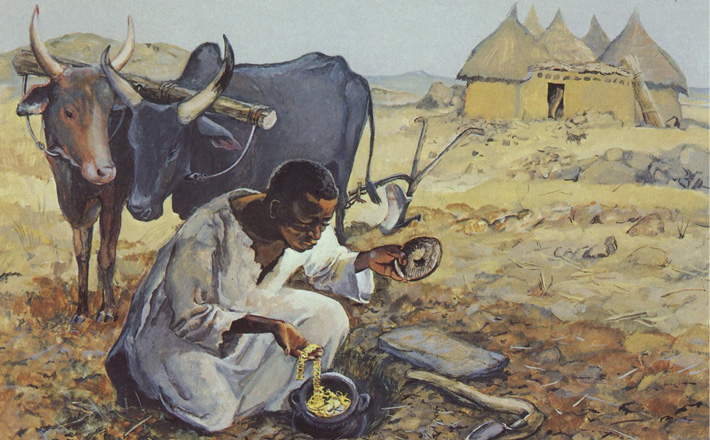Commentary on Romans 8:26-39
The surprise of last week’s reading included the idea that our share in the glorious inheritance that lies ahead is to be had only along the way of the cross.
We must put to death the body’s deeds. We must suffer together with Christ. This is how the new age dawns.
The depth of our participation in Christ’s suffering wells up in “groaning,” as we await our final hope of resurrection (8:23). But our groaning is not alone, it joins the chorus of groans raised by the created order that has gone the way of its rebellious human overlords and now awaits its own redemption (8:22).
Today we learn that this chorus of groans is actually a trio, and that the divine Spirit is the third member. The Spirit’s groans, however, are different. Whereas our groans and those of creations are signals of our own suffering and need of redemption, the Spirit’s groans are unspeakable words of intercession for those of us who groan in weakness.
The destiny toward which the Spirit is ushering us through its prayers is God’s plan for a new humanity. Romans 8:28-30 has been fodder for hundreds of years of theological debate over foreknowledge and predestination. But at the heart of these verses is the Father’s yearning for God’s people to be formed after the image of the Son.
This “image” language reaches deep into Israel’s story, back to the very beginning. Humans are created according to the image of God. This hints at the idea that salvation in Christ is a new creation project, one in which God is recreating humanity. Jesus is a second Adam figure (see 1 Corinthians 15:49, Colossians 3:10) who holds in himself the future that God has in store for us.
This new humanity comes about with Jesus’ resurrection from the dead. In Romans 1:4 Paul says that Jesus was appointed son of God by the Spirit of holiness. The word he uses in 1:4, horizo, is the same root as the word we translate “predestined” (proorizo) in 8:28. What God appointed for Jesus at his resurrection God also pre-appointed for the rest of us: being raised to divine likeness and “sonship.”
These verses weave together eternity-past and eternity-future: from God’s knowing in advance through our receiving the glory of God’s beloved children (8:17, 21). The loom of this tapestry is the resurrected Son, the firstborn of the new humanity, the first human justified by resurrection, the first human glorified with the glory of God’s children.
This integration into the family of God provides us with the bedrock reality that withstands and has the power to overcome all our fears, doubts, and insecurities: God is for us. God is on our side.
Once again, Paul propels his case with Christological force: we know the depth of God’s passion for us because God did not spare God’s own son (8:32). The verse echoes God’s praise of Abraham in Genesis 22, when the patriarch “did not spare” his own son, Isaac.
Abraham’s act was the very picture of human fidelity to God, but Romans 8:32 reverses the story: the offering of the Son becomes the very picture of God’s fidelity to humanity. The death of Jesus is the assurance for us that God will fulfill all God’s covenant promises, giving us “all things” (8:32).
Romans 8 piles up eschatological imagery: hope for future resurrection, visions of a restored cosmos, anticipation of full glorification. Another dimension of the coming future is the final judgment.
Here, too, God and Christ work in concert to ensure that this vision of the future is not one of foreboding, but of hopeful confidence. The power of the accuser has been undone by the idea that the judge has given up his own son so that he might freely justify rather than condemn (verses 33-34).
Moreover, the resurrected Jesus at God’s right hand ensures that final vindication is not some cold transaction completed through a deed in the far off past. The living Jesus (in addition to the Spirit) intercedes for us at God’s right hand.
Embodied at God’s right hand is not only the “price paid” for our salvation, but the goal God has in mind for us as well, the image to which God has planned to conform us, the first embodiment of the true humanity who will at last reign over this world as God desired from the beginning (Romans 5:17; Genesis 1:26-28).
Sitting at God’s right hand is the love that God has always dreamed that humanity would embody.
The love of Christ, which is nothing less than the love of God at work in Jesus the Messiah (8:39) undergirds the great victory that Paul anticipates in verses 35-39. Here he takes up his mantra that the Christian life entails suffering, not primarily because we must overcome our sin, but because the world is full of persecutions awaiting the faithful. It is for God’s sake that “we are put to death all day long, considered as sheep to be slaughtered” (verse 36).
But the victory is assured not only through the one who loved us (8:37), but through the very love of God itself (8:39). God’s love resolves in resurrection life for us that overcomes the greatest defeat we might face, being conquered by death.
In Romans 8, the work of Father, Son and Spirit are put on display in a kaleidoscopic vision of the coming turn of the ages. Jesus holds in himself the eschatological destiny of humanity and the cosmos as a whole, a purpose envisioned and enacted by God, and one that began through the Spirit who not only raised Jesus but will also raise us up through his power.
This is the story of God’s love. It is the story into which we are written as daughters and sons of God.


July 27, 2014